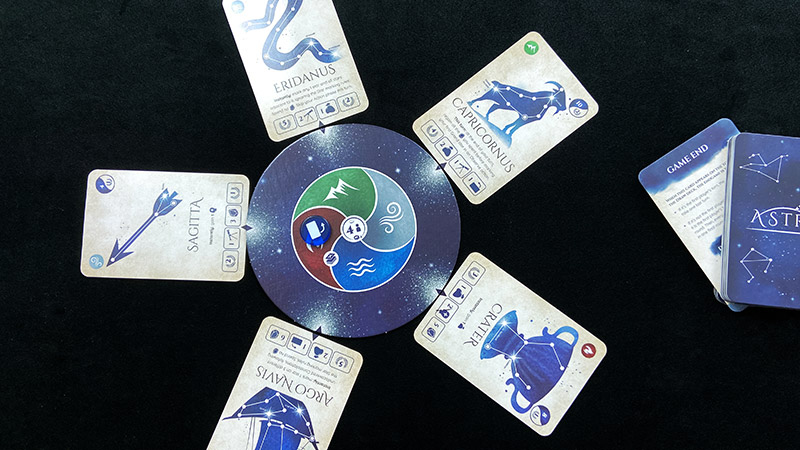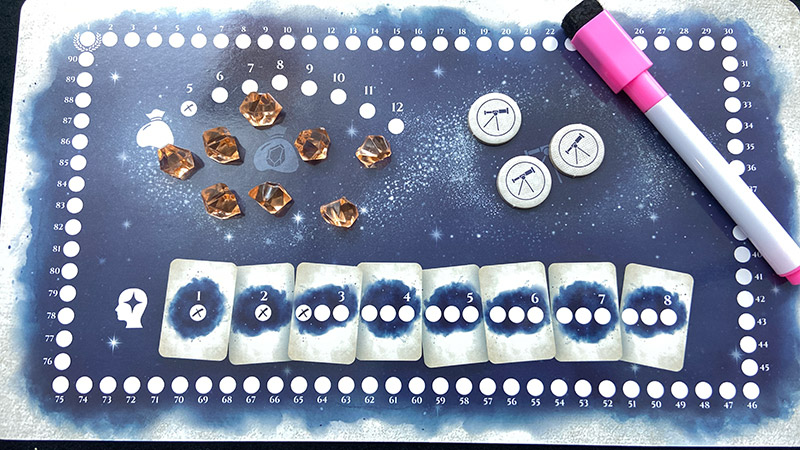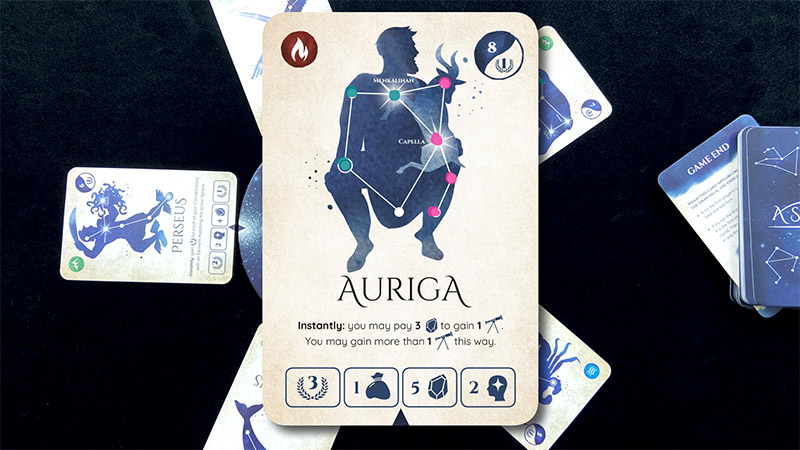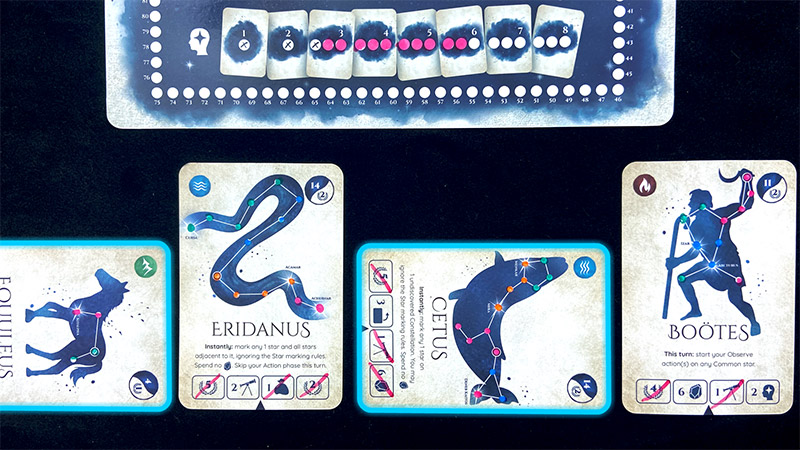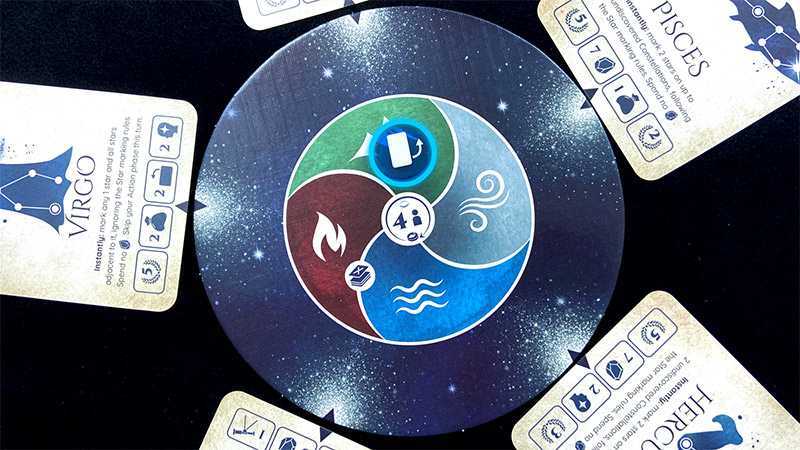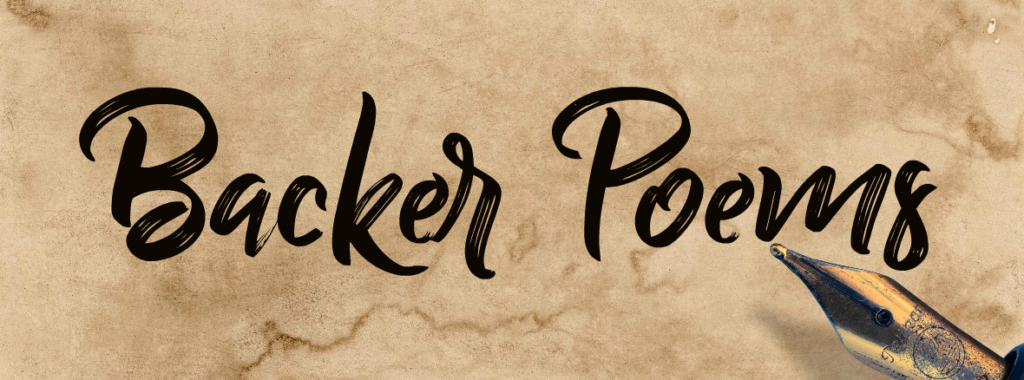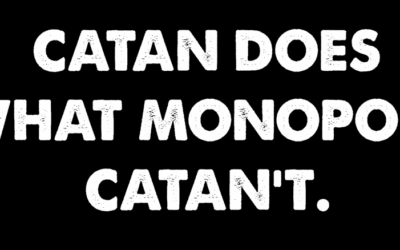For the past few weeks, i’ve been holding in a juicy secret like a youth group kid with a mouth full of marshmallows trying to say “chubby bunny.” i was approached by Mindclash Games to produce a How to Play video for their latest game, news of which has been under a press embargo. To keep my patrons in the loop on what i’m working on without completely spilling the beans on the game itself, i’ve been referring to this project under the code name “Zombie Catan,” because i have a hard time keeping a secret, and the game has nothing whatsoever to do with either zombies or Catan. Now that the publisher has announced the title, i’m happy (and relieved) to confirm that the game formerly known as “Zombie Catan” is, indeed, Astra.
And Now for Something Completely Different
Astra represents a stark and, to my mind, wise departure for Mindclash Games who, until now, have been known for their increasingly gigantic, complex strategy board games. Titles like Trickerion: Legends of Illusion, Cerebria, Anachrony, and most recently Voidfall and Septima have promised gorgeous components that underpin some seriously heavy rulesets. Trickerion is my “birthday game,” because December 1st seems to be the only day of the year that i can reliably cajole an unsuspecting friend or two to sit down and play it with me. Our last multiplayer session, with the base game and its expansion, took us over seven hours to play through. On my most recent birthday, i grappled with the game’s solo bot in a livestream that spanned 8 exhausting hours.
The Mindclash Games library is the very definition of “not for everyone.” Which is why it was so refreshing to see them take a hard right into distinctly “for everyone” territory with Astra. Here’s a game with the same eye-catching imagery and high quality components as any other game in the Mindclash oeuvre, with simplified mechanics that you can easily teach to grandma (depending on how her sciatica’s behaving).
The game’s dry erase cards and markers may convince you it’s a “roll n’ write” game, a genre that has players marking up a sheet of scores and abilities depending on the turn of a die or the flip of a card. But while those games are typically multiplayer solitaire affairs, Astra has more in common with communal pen and paper games like Boxes or Sprouts. It reminds me of a game we played in French class called Dix (“Ten”), where players took turns counting to 10 by saying one, two, or three numbers at a time. The player who was forced to say “ten” was knocked out of the game.
Connect the Dots
There’s no player elimination here. You play astronomers competing to discover constellations by colouring in stars on different cards. Each star you mark costs you a nugget of stardust, and must be connected to the previous star you marked. Certain bonus situations allow you to collect telescope tokens, which you can spend to either jump to an unconnected star on the same card, or to an entirely different card (provided you mark a star adjacent to one that’s already been marked). The first person to mark a card has to begin with the “start” star. No single constellation can be completed in one go without the use of a telescope token.
If you mark the final star on a card, you get to claim that constellation for your collection — even if that final star is the only star you marked. Every player (apart from the finisher) who marked at least one star on that completed constellation gets to claim a “boon” from the bottom of the card, with the player who marked the majority of stars choosing first. Boons can net you a variety of perks including points, telescope tokens, stardust, stardust carrying capacity, or wisdom, which governs how many discovered constellations you can keep. You can also increase your wisdom by marking special, sparkly “Grand Stars”; every constellation card has at least one of these.
The constellations themselves each have an ability you can activate by turning the card, which i’m going to brazenly call “tapping” because that Magic: The Gathering patent expired seven years ago. (Really, guys: i think you’re safe.) You can refresh your tapped constellations to reuse their powers by claiming a “refresh” boon, or by taking a rest action to refill your stardust pouch. But the catch is that each constellation belongs to a different element, and your constellations only refresh if they match the element currently in play on the common board. Once you finish resting, you move the token to the next element. Constellation cards can earn you a few extra points at the end of the game, but only if they haven’t been tapped.
The deck of cards depletes as players discover constellations. When it reaches a certain game-ending card, that triggers the end of the game. Everyone takes a final turn until you reach the starting player. End game scoring sees you collecting points from different vectors: your stardust pouch capacity, your total wisdom, the stars you marked on cards that were never discovered, leftover stardust, and untapped constellation cards. There are also set collection bonuses you can collect on a private scoring card; two constellation elements are pre-marked on everyone’s card, and each row or column earns you an increasing number of points depending on which constellations you’ve collected. So grabbing one of each element fills a column for 6 points, while getting four constellations of a kind helps you fill in an entire row for 11 points.
Strategy or Tragedy?
Astra’s simplicity belies a strategic meatiness that emerges late in the game. The first time i played, we reached a point where all of the constellation cards had been coloured in, save for one star on each. i couldn’t complete any of them because my wisdom track was too low (if you discover a constellation and you’re already full up due to your wisdom cap, you have to discard that constellation, or another in your collection). Beyond that, my daughter Cassie was the majority star-marker on every card; if i finished any single constellation, i would give her an opportunity to claim a boon, and she’d almost certainly grab a mittful of points. i managed a narrow victory regardless. In my next game, i thought marking Grand Stars and building that wisdom capacity was the vital play. But by the end of the game, i was sitting there with a maxed-out wisdom track and no actual constellation cards to show for it. i lost miserably!
The game of chicken that goes on with the Rest action keeps things interesting. You can try to guess when other players will rest because they’re out of stardust. If they rest, they’ll move the marker to the next element, which will allow you to rest and refresh one or more of your constellations. But if you miscalculate and someone else rests in between, sending the element marker past your target, you’ll be in anguish. The constellations you thought you could mine for abilities throughout the game really only come into effect once or twice at best.
i try not to review new games, especially when a publisher has purchased an editorial-free How to Play video from me, because i want to avoid the spectre of payola, or a cash-influenced opinion. To date, my Find the Fun review series has focused on well-established titles that i feel i can criticize without impacting sales, either positively or negatively. i’ll break that rule for games i feel passionately positive about, and Astra fits that bill.
Star-cross’d
i do want to point out a few caveats that could dampen the fun for some players. Astra presents a challenge for colourblind players. Even my keen eyes had trouble distinguishing the blue, black, and green inks from one another — especially since they were mere dots on a card. The orange and pink inks are similarly snug on the colour spectrum. i suppose one workaround would be to mark stars using a distinctive shape instead of a dot to help differentiate the colours: the pink player marks stars with an X, while the orange player uses a slash.
And while Astra represents a bid by Mindclash to appeal to a more casual crowd, its rulebook retains the trappings of its much larger cousin games. My copy of the publisher’s mammoth Perseverence Episodes 1 & 2 remains half-unplayed due to its intimidating rulebook, and Astra’s manual looks just as intimidating, if shorter. There’s a distinctive dry formality to Mindclash rulebooks that suggests we’re about to learn an obscure aspect of property law, instead of a fun board game. But i can hardly complain…. opaque rulebooks are why we have channels like Nights Around a Table!
Jenga, Taboo… Astra?
It’s no secret that i’ve been a Mindclash Games fan even before i launched NAaT. i eagerly follow every move the company makes. Their most recent Kickstarter campaign for Septima suggested they were dipping a toe into more casual waters, and with this release of Astra, it’s clear that they’re plunging right in. i would never in my wildest imagination expect to walk into WalMart and glimpse, amongst the myriad copies of Uno and sundry Russian Roulette Games for Kids, a copy of Trickerion or Anachrony. But might i some day find a copy of Astra? It’s not outside the universe of possibility.

